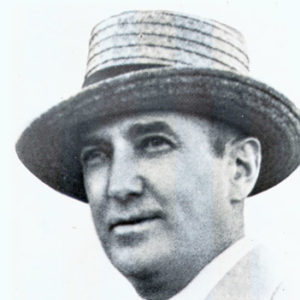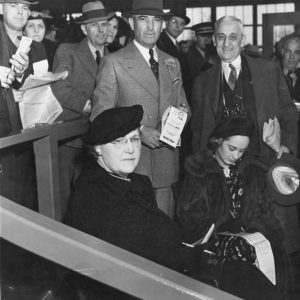calsfoundation@cals.org
Leo Patrick McLaughlin (1888–1958)
Leo Patrick McLaughlin served as mayor of Hot Springs (Garland County) for almost twenty years, allowing the city to operate as an “open” town with illegal gambling permitted under official supervision. As mayor, he reigned as the undisputed boss of Garland County politics. During his time in office, many underworld characters frequented Hot Springs’ spas, and gambling became one of the town’s most popular forms of entertainment. Even today, many recall McLaughlin as one of Hot Springs’ most memorable personalities.
Leo McLaughlin was born on June 5, 1888, in Hot Springs, the son of John Henry McLaughlin and Bridget Adela Russell McLaughlin. He graduated from Hot Springs High School in 1908, where he was a star athlete and president of his senior class. His political career began in 1910, when he was elected to the state legislature. After that, McLaughlin was elected Hot Springs city attorney in 1911, a position he held for thirteen years, with the exception of the time he spent in the military during World War I. McLaughlin was drafted into the army on May 27, 1918, and served until his honorable discharge on April 26, 1919, at the rank of corporal.
He ran for mayor in 1926 on a platform that promised Hot Springs would be an “open town.” He also pledged to improve city streets. McLaughlin delivered on his campaign promises; he directed work that paved miles of streets, and, most notably, he allowed illegal gambling. McLaughlin also orchestrated the Arkansas legislature’s approval of the re-opening of Oaklawn Park Racetrack in 1934 after a fifteen-year hiatus.
During McLaughlin’s two decades as mayor, 1927 to 1947, only one person ran against him. Prior to each election during his administration, city employees would be given a “pink slip” to share with friends and family, naming the candidates favored by the McLaughlin machine. Therefore, candidates appearing on the slip were assured support, even though the names of many of the people who voted for them could be found only in cemeteries. McLaughlin’s ability to deliver votes made him a powerhouse in state politics. All he asked was that Hot Springs be left alone to operate as an open town.
McLaughlin’s marriages intrigued the people of Hot Springs. He spent only a few weeks with his first wife, Juanita Gilliam of Hot Springs, whom he married on June 19, 1918, in Rapides Parish, Louisiana. He was in a military hospital most of their time together. She filed for divorce in Denver, Colorado, on September 5, 1919, with judgment delivered in her favor on November 18, 1919. (Interestingly, his April 1919 Army discharge papers list him as unmarried.) The findings on that date indicated that she had been living in Denver for at least a year at that time. McLaughlin evidently assumed that his divorce was finalized through these actions, but the actual decree dissolving the marriage was not issued until June 2, 1921, after he had inquired by mail for a copy of the decree. McLaughlin’s second marriage to Mary Francis Frink lasted only a few months in 1931. On the day after his second marriage ended, he married Florence Paul of Texas (November 4, 1931). They divorced in 1936. “Missing” court documents and the fact that several of his siblings never married only add to the intrigue.
McLaughlin was a showman. He drew attention from tourists and locals alike when he rode daily down Central Avenue in a sulky pulled by his horses, Scotch and Soda, while wearing a riding costume with a red carnation in his lapel. This showmanship surfaced in his political speeches as well; he often shed his coat and rolled up his sleeves as a speech intensified.
Underworld characters frequented Hot Springs during the McLaughlin administration. Men such as Al Capone, Charles “Lucky” Luciano, and Frank Costello visited the spa town with the understanding that they would exhibit only their best behavior. The nation’s gangsters utilized Hot Springs as a sanctuary or retreat; McLaughlin and his associates welcomed them, as long as they did not bother the locals and left their criminal activities behind.
Local businessmen managed the town’s gambling operations under the watchful eyes of McLaughlin and his associates. The owners and managers appeared regularly in municipal court and helped finance city government by paying fines considered to be license fees for their operations. This income spurred the development of Hot Springs, which reached its peak as a health resort during his tenure as mayor. The spa’s bathing industry hit its zenith in the mid-1940s, when visitors enjoyed over one million baths annually.
McLaughlin remained the boss of Garland County politics until Sidney “Sid” McMath, a young war veteran who later became governor, led a group of GIs in the “revolt” that put the McLaughlin machine out of office. McMath defeated McLaughlin’s choice for the position of prosecuting attorney. A grand jury began an investigation of the mayor’s administration in March 1947, and McLaughlin announced that he would not seek reelection. Although he was indicted on numerous charges, ranging from accepting bribes to being an accessory to illegal voting to misusing public funds, McLaughlin was never convicted.
McLaughlin died on May 5, 1958, of uremia. He is buried in Calvary Cemetery in Hot Springs.
For additional information:
Abbott, Shirley. The Bookmaker’s Daughter: A Memory Unbound. New York: Ticknor & Fields, 1991.
Allbritton, Orval. Leo and Verne: The Spa’s Heyday. Hot Springs: Garland County Historical Society, 2003.
“Life and Times of Leo P. McLaughlin.” Interviews recorded on audio cassette. Garland County Library and the Garland County Historical Society Archives, Hot Springs, Arkansas.
Russ, Nancy. “Life and Times of Leo P. McLaughlin.” The Record 24 (1988): 65–71.
Wendy Richter
Arkansas History Commission
This entry, originally published in Arkansas Biography: A Collection of Notable Lives, appears in the CALS Encyclopedia of Arkansas in an altered form. Arkansas Biography is available from the University of Arkansas Press.
 Leo McLaughlin
Leo McLaughlin  Oaklawn Reopening
Oaklawn Reopening 




My father, Coyle D. Henderson, ran for Garland County tax assessor in 1942 during the McLaughlin administration in Hot Springs. The vote count at midnight showed that my dad had won the election. He awoke the next morning to find out that the mayor’s choice had won the election. Records showed that the votes after midnight came from people who had died twenty years before. That same thing happened in any election of a candidate who was not endorsed by the crooked mayor and his cronies.